#Dissertation guidelines
Explore tagged Tumblr posts
Text
Know The Difference Between Dissertation Writing & Thesis Writing
In the realm of academia, the terms "dissertation" and "thesis" are often used interchangeably, leading to confusion among students and researchers. However, there are subtle differences between the two, both in terms of purpose and structure. In this article, we shed light on the disparity between dissertation writing and thesis writing, offering clarity to those embarking on their advanced academic journeys.

Purpose and Audience
The primary difference lies in the purpose and intended audience of the documents. A thesis is typically associated with master's programs, while a dissertation is commonly associated with doctoral programs. A thesis aims to demonstrate the student's mastery of knowledge within a specific field and is typically evaluated by a committee consisting of faculty members. On the other hand, a dissertation is an original research project that contributes new insights or knowledge to the existing body of literature within the respective field of study. Dissertations are often evaluated by a committee of experts in the field and may have a broader readership.
Scope and Depth of Research
Another crucial distinction between dissertations and thesis is the scope and depth of research conducted. While a thesis focuses on synthesizing existing knowledge and demonstrating proficiency in a particular subject area, a dissertation requires original research. Dissertations demand a more extensive investigation, involving data collection, analysis, and interpretation, to produce novel findings or perspectives. Dissertations typically contribute to advancing the understanding of a field or addressing gaps in existing knowledge, whereas thesis focus on a comprehensive understanding of a specific topic.
Length and Structure
In general, dissertations tend to be longer and more comprehensive than thesis. A thesis usually ranges from 50 to 100 pages, whereas a dissertation can span from 100 to several hundred pages. This disparity in length is reflective of the differing levels of research and analysis conducted. However, the specific requirements regarding length and structure can vary between institutions and academic disciplines, so it is essential to consult the guidelines provided by the respective program or department.

Originality and Contribution
As mentioned earlier, one of the fundamental aspects of a dissertation is its originality. Dissertations are expected to contribute something new to the field, whether it is through the discovery of new knowledge, the development of a new theory or framework, or the application of existing knowledge in a novel context. Thesis, on the other hand, are focused on synthesizing existing information and demonstrating the student's ability to critically analyze and evaluate existing research.
Time and Complexity
Given the difference in scope and depth of research, dissertations typically require a more extended period to complete compared to thesis. The process of conducting original research, collecting data, analyzing findings, and writing a comprehensive dissertation demands substantial time and effort. Thesis, while still requiring rigorous analysis and synthesis, can often be completed within a shorter timeframe.
Conclusion
While the terms "dissertation" and "thesis" are often used interchangeably, understanding the distinctions between them is crucial for students and researchers. Dissertations are characterized by original research, a broader scope, and a contribution to the existing body of knowledge, while thesis focus on synthesizing existing information and demonstrating mastery of a subject. By comprehending these differences in purpose, scope, length, and originality, students can embark on their academic journeys equipped with a clear understanding of the expectations associated with dissertation writing and thesis writing.
#Dissertation vs. thesis#Difference between dissertation and thesis#Dissertation definition#Thesis definition#Dissertation purpose#Thesis purpose#Dissertation vs. thesis length#Dissertation vs. thesis structure#Dissertation research#Thesis research#Dissertation contribution#Thesis synthesis#Dissertation audience#Thesis evaluation#Dissertation guidelines
1 note
·
View note
Text
Another example of the nonsense I have to deal with from my advisor: while reading my conclusion, he asked me "shouldn't you put full citation details in the first footnote?"
I am using Chicago NB style and have been since I gave him my first chapter more than a year ago. And no, that style (a very standard one in theology) does not require full citation details in the footnote.
#bad enough i'm forced by the graduate school style guidelines to put all the bibliography together#primary sources and secondary sources for 4 different authors just bumping up against each other all over the place#it's 20 pages long#not because i'm so obsessed with secondary sources (i'm not) but because that's what it takes to cover 4 theologians#the dissertation#pray for meeeeeeee trying to finish editing my conclusion and format the entire thing this week#a week that also includes 20 hours of babysitting#and ends friday when i have to drive to georgia to help with my grandma
18 notes
·
View notes
Text
the reason i’m avoiding doing this work is bc i’ll have to move on to the next project & idk if i still have access to cad/sketchup & im too scared to find out lol
#stream#like ALSKALSKALKALAKLSKSLALASKALKSA#I HATE IT SO MUCHB#like i would be done w my dissertation in like a week max#bc i actually ENJOY IT#these 2 projects i’m just -_-#well the first 1 ok but it’s long & daunting & im a pussy#i literally have been given word counts u dumbass idiot fucking bitch just follow those guidelines u moron#i’m writing notes & putting them everywhere to make myself do it#taping a note to the mirror saying ‘do it u stupid bitch’#it’s been 20 min & here i am still doomscrolling#i also have to grocery shop SO bad but i DO NOT want to spend money & i need EVERYTHING out of my pantry so I DONT HAVE TO FUCKING MOVE IT
1 note
·
View note
Text
Update on fanbinding dissertation: binding the dissertation itself!
After many days and nights of writing and wrangling footnotes and proofreading (where I couldn't convince my laptop that yes, I meant textualisation, not sexualisation), 'twas time to bind the beasts! In three copies, no less! Which I approached with way too much confidence from my one fanbind experience, and came with many fun little surprises due to the format guidelines I had to follow 🤡
This is going to be a long one, so here's my happy unfocused mug to confirm that it all ends well:
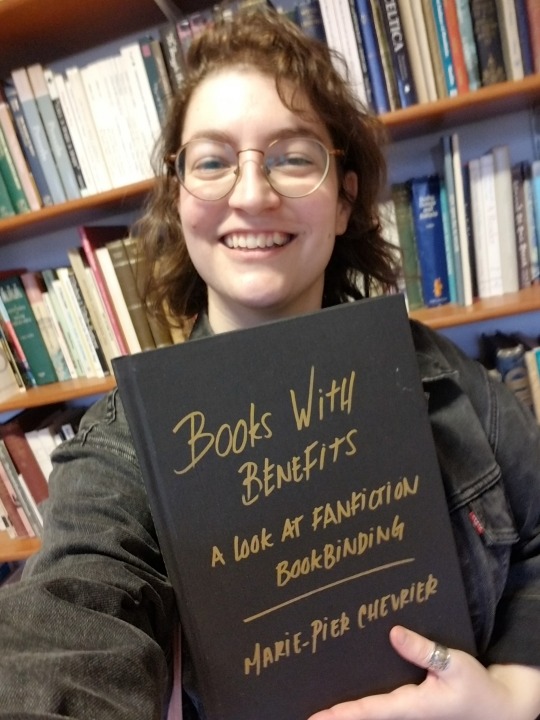
First pickle: The typesetting. I absolutely loved typesetting fanfic, but the dissertation had to be A4 (way less fun, boo-hoo), one-sided, with every page numbered. Did you know that LibreOffice won't let you add blank pages and only number the non-blank ones, without skipping numbers? In order to print signatures I could fold into one-sided pages, only numbered on the right-hand pages, I ended up switching to landscape orientation and including the equivalent of a blank page in the left margin.

Second pickle: The imposing, which I couldn't figure out using the amazing bookbinder with my weird landscape 2-page layout. I finally gave in and rearranged all the pages manually, which looked like p. 1 on the recto / p. 10 on the verso, then p2/p9, p3/p8, p4/p7, p5/p8, p6/p7. And because there was no way I was paying print-in-colour prices for all of this, I further split the manually imposed pages into two files, one for the greyscale printer (cheaper) and one for the colour printer (highway robbery). Still came up to ~£70, just for printing.
Very glad I went in chunks of 10 for the signatures, it made both the math and the folding using sheets from two different piles much easier, highly recommend (if for some absurd reason you also want to bind one-sided numbered pages in folded signatures).
Third pickle: Linear time. Had planned on having so much time to print and bind this thing, but kept writing and rewriting and proofing and oops! It was due in less than 24 hours and it was still not out of the laptop. So.
22/09/24, 6pm: Got to the library, started printing.
6.45pm: Found another printer where all the paper was the same shade of white, started printing again 🤦♂️ (kept the the misprints to use as scrap paper when glueing)
7.30pm: Started folding the 150 sheets of paper (3 x 100-page dissertation, 2 pages per sheet). Went from the last episode of The Magnus Protocol, to an episode of Welcome to Night Vale, to deciding restart The Magnus Archive, which felt almost poetic.
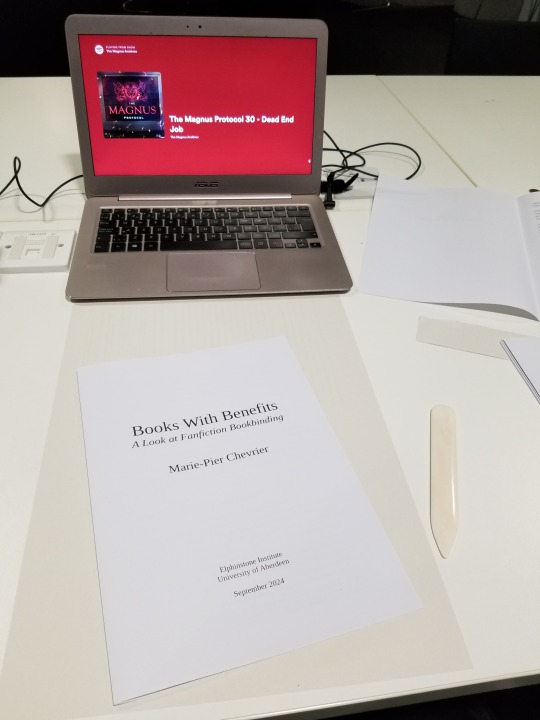
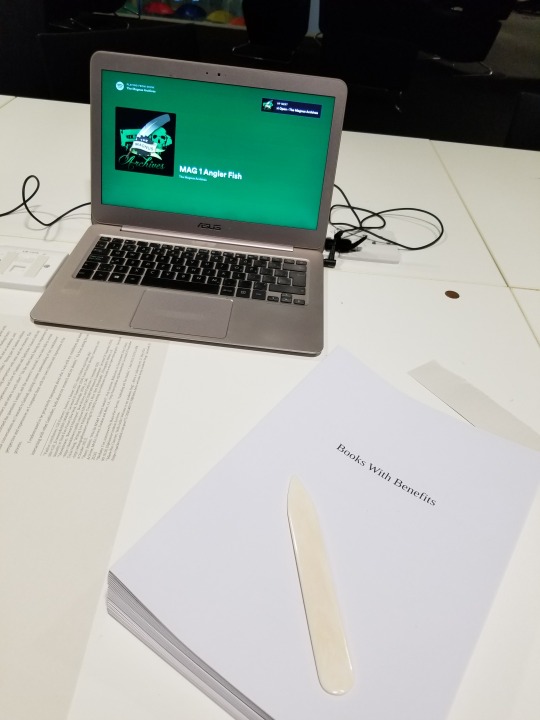
9pm: Headed back home, trimmed the edges (with a borrowed guillotine), folded the endpapers, stabbed everything. Lack of pictures to be blamed on my inability to mess with linear time, and the eventual sleep deprivation.
10.30pm, I think? Started sewing the signatures together, again with Supernatural (which I started rewatching when I submitted my first dissertation assignment in mid-May, and finished 2 days after submitting the dissertation itself, again, such poetry).
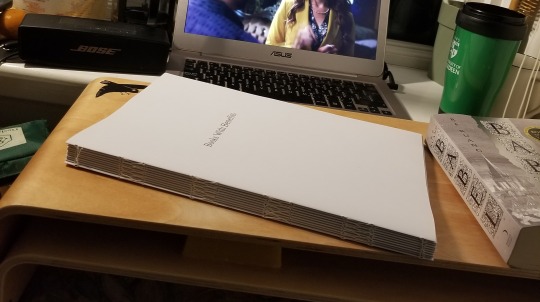
2am, probably? Tipped the endpapers and glued cheesecloth over the spines. Somehow figured out where to set the three textblocks to dry (I don't have a press). Sadly gave up on sewing on (or glueing) headbands, because time.
3am-ish: Cut the missing cover pieces out of millboard (had already cut 4 of 6 covers, since I knew it had to be A4), measured the spines of the three textblocks and cut those as well.
???am: Did some math, because sure, that's the right time for that. Cut the bookcloth to size, glued the cover pieces on the bookcloth. Remarkably only messed up the measurements on one of them! That means one of the copies has a millimetre of millboard showing in the inside corners of the back cover, but not enough time/bookcloth/millboard to redo it, onward we go!
Way past dawn: Took a break for food while the covers somewhat dried. Cased the three textblocks in the three covers, with the endpapers bubbling, which took me by surprise since it was the same paper and same glue I had used for the fanbind without any problem. I'm now thinking that bigger book = more time needed to apply the glue = endpapers getting warped, but I was so exhausted by this point that who knows. Again, no time to redo it!
9.30am: Stacked the dissertations under the heavy reference books I used to write the dissertation. Toute est dans toute hein. Went to bed while they (mostly) dried.
2.30pm: Woken up by my neighbour's dj set. Eventually put all that hard work in a tote and walked to school to hand it in at 4.30pm.
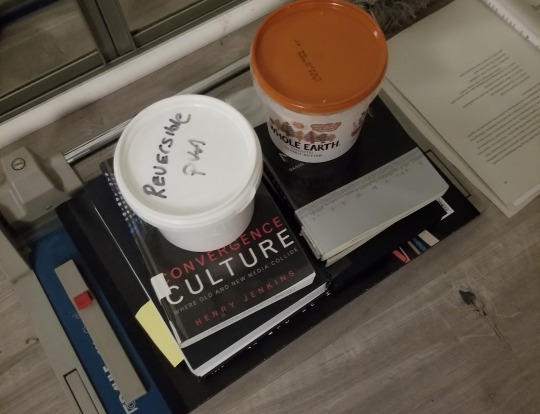

Fourth and last pickle: The titling. Couldn't find paper long enough to do a half-dust jacket like I did last time. Had big cutout plans, ran out of time and couldn't finish testing those. Also had some thicker textured paper I thought of cutting and glueing to the cover as a title card, but it turned out too thin and was warping. Finally resigned myself to submitting it with a blank cover, but one of my teachers asked if I would mind adding the title on with metallic markers to make it easier to identify (one copy will eventually be on the shelf at the Institute), and I'm SO HAPPY with how it turned out. Metallic markers. Why didn't I think of that. (I did, however, think about dressing appropriately for the occasion.)
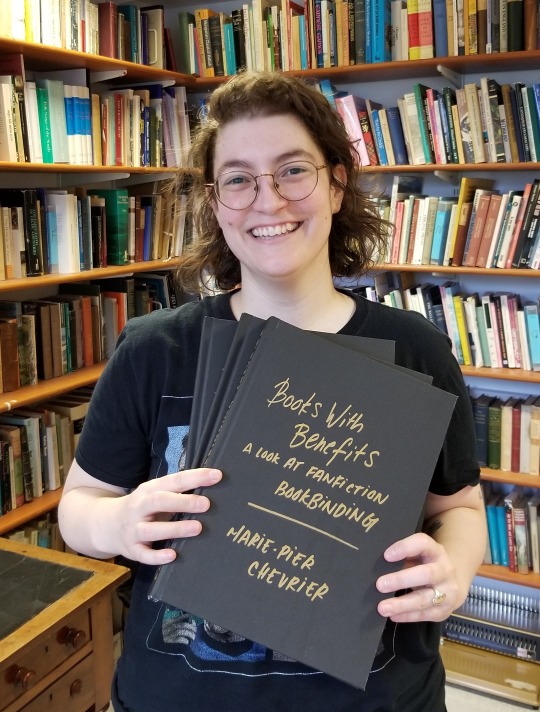
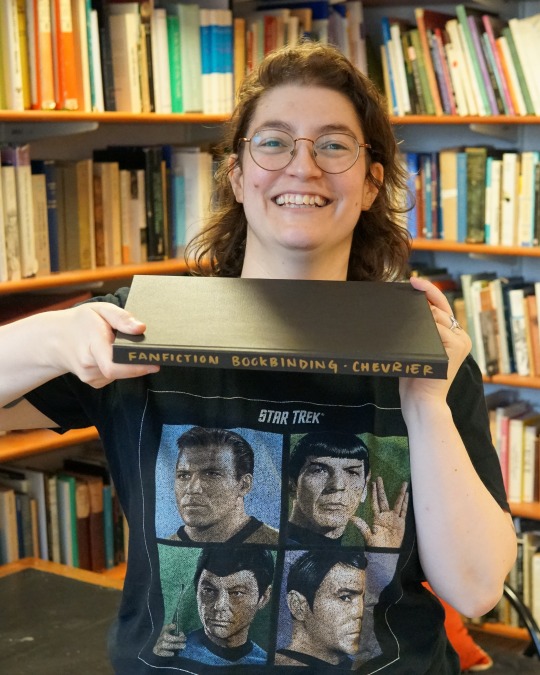
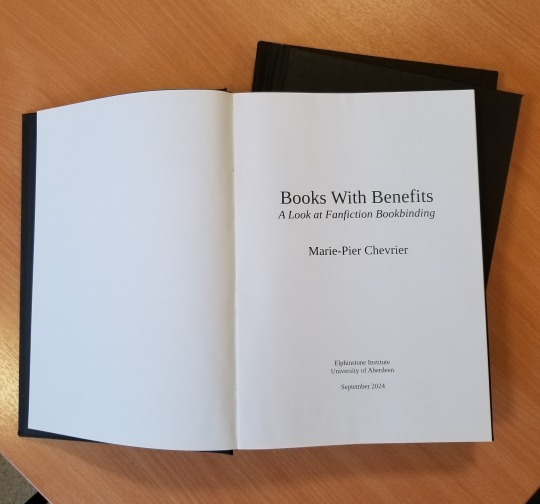
So, is it possible to print and bind 3 books in less than 24 hours? Yes! Am I glad I did it? Also yes, very satisfying, love being extra! Would I do it again? God no, I've been sleeping for two weeks and I still haven't recovered. Can't wait to start binding something else though, so I guess it wasn't that bad.
That's it! That's over! Aaaaaah! Now waiting for the grade and comments, and hopefully soon I'll be able to share the content as well.
I'll also try to post some more about the research/writing process itself, somewhere between the late nights reading international treaties on income tax and the early mornings spent figuring out how to apply for a phd next.
Thank you so much to everyone who followed along, this was way more fun than I ever could have hoped!
#fan studies#fanbinding#bookbinding#research#ficbinding#dissertation#fanbinding dissertation#autoethnography#fanfiction#fandom#fanfic
490 notes
·
View notes
Text
Something I'm tossing around in my head re: Chat GPT and academia is that...in some ways, I think it's a symptom, rather than the root problem. Not just of the structural ways that mainstream pedagogy + the general structure of academia (particularly in the States) sets some students up to fail, but in the way that a lot of work, even at the graduate and above level, is in itself treated as a product to be cranked out in the least amount of time possible as opposed to a work of dedication and love that requires thought and care and intricate research.
You want to get an undergrad degree? Crank out ~2-3 essays a year. These can be varying degrees of research, because the point is you need to get them in NOW and you need to get them in QUICKLY and you can't take any more time to do them than necessary.
(And for students who are later along in their academic careers, writing 8-10 page papers is nothing, but to that undergrad who's stepped into class for the first time? It might be the most complicated thing they've written.)
You want a PhD? Crank out that dissertation, and don't you DARE take longer than you should. How can you do it? We don't know, our obligation to you is over at five years. Also, you have a semester to come up with a ~25 page prospectus that gives a detailed plan for your dissertation before you can even begin WRITING it, which you'll have to get approved by your committee, so good luck!
Also, don't forget, while you're doing that, you need to keep submitting articles for publication, which you will, of course, have to format individually according to the style guideline of the journal you're publishing to! Publish or perish, so keep your head above the tide or you'll end up drowning!
And, on top of that, expect to write ~ten page presentations for conferences! Don't worry, you don't need to cite your sources TOO rigorously for this one, but you are going to need to make sure you know what you're talking about, otherwise you might be humiliated in front of the scholars you want to impress! Write, write, write! Create that Powerpoint!
You want academic tenure? Crank out that monograph! And don't forget to do it sooner rather than later while ALSO publishing articles and coming up with teaching plans!
Also, don't forget, with everything that you write, that it should be on something popular! Something in keeping with the latest trends, so you can be on the cutting edge! Wanted to do something else? Why did you enter academia if you wanted to follow your own research ideas?
And the point isn't that I think that Chat GPT is GOOD or that it SHOULD be used to write an entire paper. Frankly, I dummied a dissertation outline on it (note: my uni account...which I still hate that they provided for us...doesn't use it to train data, meaning that the environmental impact is minimal) and it was bland as fuck, factually inaccurate, and dated. I DON'T use it because, beyond the morality or ethics of the situation (which I think are more complicated than a black and white "It's harmless" or "It is an actual technological death cult aiming for world domination"), on a purely pragmatic level, my field is TERRIBLE for it.
RATHER my point is that it's hard to take arguments about the sanctity of human creativity seriously SPECIFICALLY with regards to academia when it's an industry that has systematically pried human creativity out of itself and encouraged creating an unsustainably massive amount of work at once if you want to survive and even though I am going to do everything possible to make sure my students DON'T use it for their assignments as a primary tool...I can kind of get why they would be drawn to it beyond just "they're lazy."
28 notes
·
View notes
Text
Kinktober 2024
Howdy y'all! I JUST turned in my dissertation so I'm all done with grad school. This means I'll be able to do Kinktober this year <3 I can't guarantee that I'll be able to continue after this year but I also don't want to feel like I'm scaring people into participating. I just want to let everyone know that I really do love these events and I look forward to it all year, so I may try and find a way to make it work even after this one.
I’m looking at opening up about 5 slots this year with recommended donations of $18-22 for ~2k words per piece.
Oni!Hanzo | breeding, biting, double penetration - SEQUEL
Ghost/Soap/Reader | sex pollen, breeding kink
Open
Open
Open
I'm starting early so I have plenty of time to write between my other projects, and also to hopefully give everyone more time to get a slot.
Fandoms I will write for include (I'm so sorry I've been living in a shack without internet I'm not caught up on anything):
COD MW2
RDR2
Resident Evil 8 Lady Dimitrescu
Mandalorian
Witcher
Signalis (NOT Adler)
Guidelines
Reader insert only as always
Specify the gender of the reader character. I write cis and trans characters I just need specifics
Give me a detailed prompt with enough specifics and meat for me to go off of. A setup, a trope, please specify who is dominant/giving/topping in NSFW scenarios.
I don’t write modern AU for RDR2 and pregnancy is a squick for me. Otherwise, I feel like I've gotten more comfortable with ALL the fucked up and weird kinks. Try me. I don't judge.
Also, feel free to combine 2 or 3 kinks into one prompt if you think they’d go well together!
#clare screams#kinktober#kinktober 2024#please help me afford groceries now that I'm out of school i am offically SO BROKE
21 notes
·
View notes
Text

Hey y'all. We're almost at the end, so here's a reminder of posting details for anybody doing the last minute thing.
Posting Details
Here is our Ao3 Collection for the Event. Works will remain unrevealed until the event. Your works should be submitted here by the 1st of February. Ideally this will be by midnight Eastern Time at the end of the 31st, so that we can create our reveal schedule ready for our first reveal Saturday morning. If you absolutely have no other option but to need to submit later on the 1st February, please contact us via Discord or Tumblr (Discord server invite link available at the bottom of this post).
If you are posting fanart, you should still post this to ao3 and our collection there, but you will need to host the images offsite. Here are Ao3 guidelines for how. You can try using private tumblr posts, but here are four free image hosting site options that allow adult content: Squidge Images, Postimages, put.re, and Macintosh Garden. We do not recommend using discord to host images, as Discord has changed how they handle image links and no longer works reliably.
If you submit your work but need to make last-minute edits before the deadline, you can do so by visiting your Ao3 Dashboard near the top right of the screen, and hitting the 'Edit Works' button - it will list all your works, including unrevealed ones. You can edit from there. Alternatively you can access all your works through the statistics page.
Event Rules
The theme is Love Language. All submissions should try to incorporate the theme in some way (even if it’s a small way). We encourage creative interpretation of the theme.
All submissions must be your own creation and cannot have been posted publicly beforehand. Fresh creative blood must be spilt!
Stories and artwork can be set at any point in the past or future, in hidden glimpses we never saw in the show, reunion stories, worlds where Darla’s still around, etc. The characters can be souled or unsouled or in any what-if or AU your heart can dream up.
Works should involve at least two members of the Fanged Four. The main ship and primary focus should be the Fanged Four or one of the sub-pairings (Spangel, Dangel, Sprusilla, Darsilla, etc). Any romantic endgame for a member of the Fanged Four should include at least one other member of the Fanged Four.
Minimum word count for fic is 100 words. There’s no maximum - one shots and chaptered works are equally welcome, but they should be complete and not part of a pre-existing fic series.
Once the event is finished, creators are free (and encouraged!) to write sequels or prequels etc to their event works and turn it into a series down the line, but the event work should still be able to be satisfyingly read in isolation. We also understand that some creators like to put works into a series for purely organisational purposes. This is fine! But we would prefer that you wait until the event is over to do so.
Any rating is welcome for both fics and art, but please tag responsibly. 'Creator Chose Not To Use Archive Warnings' is a valid warning.
No bashing of the group or its members, please. We’re here to show them love. This is a celebration of the characters and their dynamics with each other, not the place for your dissertation on which vampire is better or worse than the others. They’re all good vamps, Bront.
Be excellent to each other!
Our Discord is here if you have any questions, or want to chat with everyone about the Fanged Four and Fangfest. It’s also where we’ll be hosting our watch parties during the event.
#febfangfest2025#buffy the vampire slayer#angel the series#fanged four#buffyverse#spike#angel#darla#drusilla#spangel#sprusilla#darla x drusilla#angel x darla
8 notes
·
View notes
Text
Watching hot fuzz again for the first time post autism diagnosis is fucking wild
Nick is so autistic;
constantly baffled by NT bullshit
he has like two facial expressions the entire movie,
needs excess alcohol to relax in a social setting,
routine procedure official guideline rule rule rule,
communication is either monotone and formal or completely falls apart when under stress and ends up yelling,
misses Danny's Birthday and then just leaves to correct it with no explanation which probably looks rude as hell.
Stimming with his hand grip thing
Hates being touched by anyone that he's not super comfortable with (danny)
I could write an entire dissertation
156 notes
·
View notes
Text
Welcome to the Horny Jail
This is the side blog for @whoishotteranimepolls , where I have moved the non-poll series Horny Jail's Anonymous, Defend your Blurbo, and the horny scale. Possibly Fandoms vs Illiteracy if one of those ever shows back up.
All confessions must be about characters confirmed 18+ or assumed adults
Characters, where age verification is complicated due to magic, time travel, other universe shenanigans, or the immortal child trope are accepted on a case-by-case basis and will be tagged with the #schrodingers minor just to be safe
All characters submitted for the series must qualify for my polls on my main blog, so no exclusive video game characters.
The Series
Defend Your Blurbo, my weekly series discussing how some people can find (insert Blorbo of the week) attractive. This can be funny. This can be stupid. Sometimes, this involves PHD level dissertations in defense of our favorite 2D characters. You never know what you're going to get. Also, look under the Defend your Blurbo response tag. That's where all my followers send their responses to the original Defend Your Blurbo post. Those can get wild! DyB Masterlist and Series rules and guidelines. This series is why I now have the #thirsty tag. Due to the amount of unhinged thirst that is NSFW, you can block those tags if you don't want to see them.
The Horny Scale is a series where people ask where particular fandoms fall on the horny scale. I made details here, and the Masterlist. The series also uses thirsty tag system
Horny Jail's Anonymous: Dyb and the horny scale's bastard child. For all the unhinged thirst and love letters to blorbos that I have received that do not fit dyb. Think of it as anonymous confessions. They come in two varieties: the Thirsties for all the thirsty confessions and the Fluffies for all the wholesome fluffy ones. They will be tagged with #thirsty and #fluffy accordingly. More details here, here, here & here
Defend your blurbo, horny scale, and Horny Jail's Anonymous entries can be sent at any time
Fandom Jail, aka Solitary Confinement
All fandoms listed below are serving their jail sentence due to bad behavior. Here are the dates of when you can expect to see polls from these fandoms again
9 notes
·
View notes
Text
Sunday 5th May
T-minus two days until the final draft of my dissertation is due in. Honestly, the idea of just letting it loose into the world like that scares me, I think this must be what it feels like when your child grows up into an adult.

Incomplete from Yesterday:
Finish writing first draft of Chapter 3
Re-write the introduction using the chapters as a guideline. (1000 words)
To do:
Write conclusion (1000 words)
Write the abstract.
Work out the formatting.
Complete:
Chapter 3 draft 1, 1933 words. Still missing a conclusion, but I'll add that in on the re-write.
Introduction finalised: 1280 words, slightly more than I wanted, but it should be fine.
Written the abstract (still not entirely sure about it, but my supervisor said not to worry too much.)
Worked out the formatting, added in the intro, abstract, chapters 1 & 2.
Hoo boy. I've actually got everything written somehow. It's formatted into one document, so I'm gonna leave it for now and come back later to go over and check for any basic errors before I submit.
Cups of coffee: ☕
#undergrad student#studyblr#uniblr#study blog#chaotic academia#studyspo#study motivation#university#student life#student#dissertation
16 notes
·
View notes
Note
do you have any advice for someone going into writing their bachelor's thesis? I'm having trouble pinning down a topic that seems manageable.
Hello!
This will be highly field dependent, so my advice will be most relevant for social sciences and humanities - anyone from STEM, fell free to chip in as well!
Let's see, if a student came in at office hours and asked me this, I would probably break it down like this :
Get familiar with the expectations
A thesis the first big, semi-independent work you will have to conduct, so it's uncharted territory. Get rid of the anxiety by looking again, and again, and again, at any guidelines set by your course director, school, college. How long is it supposed to be ? Is there a set structure ? Is there a first draft due before the final draft ?
Look at dissertation from previous years! Ideally, find at least 3 so you can have an idea of how diverse the work can be.
2. Talk to your supervisor
And don't bullshit your way into impressing them. If you are absolutely lost - tell them. If you already have an idea - tell them. If you hesitate before three topics - tell them. That first meeting is where you lay down all the ground work. In all likelihood your supervisor barely knows you, so give them something to work with !They want you to do well!
3. Start broad, then narrow it down, narrow it down, narrow it down
"Pinning down a topic" is an iterative process, but the good part is that it's also an introspective one, in my opinion. It's the art of peeling back layers to figure out what, EXACTLY, is it that you want to know.
For example: let's say you want to broadly talk about accessibility in higher education. Ok, great ! But what exactly, is it that makes it interesting to you ? Have a sit down with yourself. Are you wondering how higher education defines disability ? Or is it about how disability impacts entrance into higher education ? Or specifically access to teaching resources ? It could be about the architecture and physical design of campus spaces, or it could be about the lived experience of disabled students ?
Some of these you will not be that interested in, some of them you are interested in but not in an "academic" sense, ... so you can start to narrow it down. Some you may already have a vague answer in your mind, so then you play the three year old toddler with your self, by asking "but why", "but why" until you feel like you have reached the real crux of the issue.
Throughout this process, you can 1) take peaks are the relevant literature to help you move the thought process along and 2) talk with your supervisor so they can steer you in a productive direction.
Because...
4. You are looking for a Good Bachelors Dissertation Now (TM).
Broadly this is what you want to keep in mind :
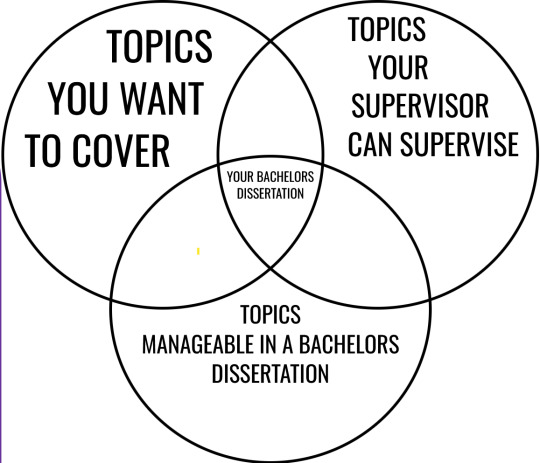
A good bachelors dissertation for you, with this supervisor is not a good PhD dissertation, not a dissertation that would be great with another supervisor, not a dissertation that doesn't fit your degree... It is good in its context, and that context is :
you + your supervisor + now
Don't feel disappointed or frustrated if you are steered in a slightly different direction - it may be one where your supervisor can actually help you better. Or if you are asked to downscale or scope down: better a narrower dissertation where all is properly covered than a too ambitious one that you will not able to carry out properly give the limits of the format.
Hope that helps!
#adventures in academia#ask me things#all in all: communicate ! with ! your ! supervisor ! They are not out to get you !#and they cannot know how you re doing if you are not telling them!
7 notes
·
View notes
Text
Understanding the PhD Anna University Annexure Journal: A Guide for Aspiring Scholars
If you're pursuing a PhD at Anna University or planning to, you're likely familiar with the significance of the PhD Annexure Journal. It’s a crucial aspect of the doctoral journey, yet many students find it daunting. In this blog post, we will demystify the purpose and importance of the Annexure Journal and provide some essential tips for making the most of this important component of your PhD journey.
What is the PhD Anna University Annexure Journal?
The PhD Annexure Journal is a document that tracks and consolidates your academic progress and research work throughout your doctoral studies at Anna University. It's an official record of all your research activities, including your progress, research methodologies, experiments, and findings. This journal serves as a reflection of your scholarly activities and is essential for ensuring that you're on track for a successful defense of your dissertation.
Why is the Annexure Journal Important?
Documentation of Research Progress: The Annexure Journal is designed to document the evolution of your research over time. It helps both you and your advisors keep track of your work, ensuring that your research goals align with the university's standards and guidelines. By maintaining a consistent record, you can reflect on how your ideas have developed and whether your research is moving in the right direction.
Facilitates Communication with Supervisors: The journal serves as a vital communication tool between you and your PhD supervisors. It helps them stay updated on your work, so they can provide timely feedback and guidance. It’s also a helpful reference when it’s time for formal evaluations and reviews.
Prepares You for the Final Defense: As your research progresses, your Annexure Journal becomes an important tool for preparing your final thesis or dissertation. When it’s time for your defense, the journal can help you organize and present your findings in a clear and coherent manner. It essentially serves as a roadmap to your final submission.
Helps You Stay Organized: The PhD journey can sometimes feel overwhelming due to the extensive research, writing, and experimentation involved. The Annexure Journal helps keep everything organized, ensuring that no detail is overlooked. By maintaining a detailed record of your progress, you can easily track your milestones and adjust your approach as needed.
Key Components of the PhD Annexure Journal
To make the most out of your Annexure Journal, it’s important to understand its key components:
Research Proposal: At the start of your PhD, your research proposal will be included in the journal. This serves as the foundation for all your future research. It’s important to keep this document updated as your ideas evolve over time.
Literature Review: Your literature review section helps you track the sources you’ve reviewed and how they influence your research. It’s also useful for noting key authors, theories, and methodologies in your field.
Methodology: The methodology section is where you’ll document your research methods, experimental setups, and data collection processes. Keeping this section detailed will help you revisit your approach during later stages of your research.
Progress and Findings: As you advance in your PhD, document your research progress and any findings. This could include preliminary results, ideas you’ve tested, or challenges you’ve faced. This section helps ensure that you stay focused on your research objectives.
Feedback and Revisions: Include feedback from your supervisors or peers, along with any revisions made to your work. Documenting this feedback ensures you’re improving and refining your research continuously.
Tips for Maintaining Your Annexure Journal
Stay Consistent: Updating your journal regularly is key. Set aside time weekly or bi-weekly to ensure that you stay on track. Even if you haven’t made substantial progress, it’s important to document the small steps.
Be Detailed: The more detailed you are in your documentation, the better. Include references, data points, and even challenges you encounter. The more information you have, the easier it will be to revisit your research at a later stage.
Use it as a Reflection Tool: Don’t just see your journal as a task you need to complete—use it to reflect on your academic journey. It can help you identify patterns in your work, better understand your research process, and assess the evolution of your ideas.
Keep it Professional: Since this journal is an official document of your academic journey, ensure it is maintained professionally. Keep your writing clear, concise, and formal, and ensure that all references and citations are properly formatted.
Incorporate Supervisor Feedback: Your supervisor’s feedback is invaluable. Ensure you’re documenting it and taking steps to implement their suggestions. This will not only improve your work but also strengthen your relationship with them.
Conclusion
The PhD Anna University Annexure Journal is much more than just a requirement; it’s an essential tool for staying organized, tracking your research progress, and ensuring that you’re on the right path toward completing your doctorate. By understanding its importance and maintaining a detailed, consistent record, you will find that it helps you stay focused, engaged, and prepared throughout your PhD journey.
Remember, a successful PhD is not just about completing research—it's about documenting, reflecting, and continually evolving. Your Annexure Journal is the perfect tool for doing just that. Keep it up to date, and let it guide you toward a successful and rewarding academic career! Ready to streamline your PhD journey and stay organized with your Annexure Journal? Visit Ondezx: Anna University Annexure Journal for helpful resources, expert guidance, and tools to make your research process more efficient and successful. Start managing your PhD journey with confidence today!
#academia#education#exams#studying#university#anna university#Annexure journal#thesis writing#journal publication
3 notes
·
View notes
Text
Thesis Writing Process
The 5-Step Process for Writing a Thesis: A Super Comprehensive Guide
Writing a thesis is a glorious academic moment in which perhaps the cumulative outcome of four years of study and research is being produced. While intimidating as a thought, however, it breaks down into pragmatic steps that ensure clarity and efficiency, and a polished final product. This blog publishes a comprehensive guide on a 5-step process to guide you through your thesis journey.
Step 1: Select and Refine Your Research Topic One first step in writing a dissertation is to select a topic of interest to you, relevant to your academic interest, career objectives, and the study area. Write down general ideas that interest you as well as are applicable to your field of study. Begin preliminary research into your selected ideas.
Narrow the Focus: A narrow, well-defined research question is easier to manage and is more meaningful than an open-ended one. It can be related that a broad topic like "Climate Change" is better narrowed down to be, "The Effects of Renewable Policies towards Reducing Carbon Emissions in Urban Areas."
Step 2: Do a Thorough Research
Having a topic in mind, proceed with research. Research is essentially collecting and synthesizing information that will lead to an excellent grounding for your thesis.
Primary vs. Secondary Sources: Mix primary sources, like experiments, surveys, or interviews, with secondary ones, like journal articles, books, or reports.
Take Notes: Use Zotero or End with the collection of references and systematic notes.
Critical Evaluation: Examine your sources critically to determine if they relate to and support your thesis question and are appropriate to your topic. Maintain a journal of interesting ideas, major findings, and citations as you conduct research. This will facilitate the writing process later on. --- ### Step 3: Thoroughly Give It a Good Framework A good thesis is also well-structured. Before you begin writing, draft a rough outline of your work to ensure it will be orderly.
Introduction: State your research question, objectives and the reasons why your study holds its importance. \
Literature Review: Summarize and critique previous studies to pinpoint what is unique in your study. \
Methodology: Discuss the methods and tools that you used to carry on your research. \
Results and Discussion: Present your findings, analyze them and relate to your research question. Conclusion: Summarize major findings and say what they imply, and indicate future avenues for research.
This road-map achieves proper flow and coherence for both the writer and the reader.
Core Sections First: Prepare methodology, results and discussion first because such parts are often the core sections of your thesis.
Be Clear; Be Concise: Avoid using jargons unless unavoidable and define technical terms to reach more audiences.
Get Feedback: Share drafts with your advisor or peers in order to get constructive feedback.
Edit Ruthlessly: Review for clarity, grammar, and coherence. Tools like Grammarly and Hemingway Editor can help polish your writing.
Set daily or weekly writing goals to maintain steady progress.
Step 5: Finalize and Defend
Prepare your thesis for submission and defense.
Formatting and Citation: Format according to your institution's guidelines on the formatting, citation, and referencing. Double-check everything for consistency.
Proofread: Read through the document at least three or four times for spotting typos, inconsistencies in formatting, or other mistakes. You might consider hiring a professional proofreader to help you out.
Practice Presentation and Q&A: Rehearse your presentation a number of times. Think about questions that may be presented to you by the panel. Be prepared to back up your statements with evidence and speak assertively regarding the research.
The day you defend your dissertation is the day to celebrate all the hard work and achievement made until then. . Conclusion Writing a thesis is quite demanding but highly rewarding for it tests your critical thinking abilities, researching, and the skill to write. If you break down these steps to the choosing of the topic, research, structuring, writing, and finalizing, you'll be in a better position in handling the entire process. Remember that persistence and careful planning will get a thesis written that will not only demonstrate one's knowledge of the subject matter but also contribute to the field.
In fact, it takes a lot of courage to move on with this project, and these steps shall take you to it!
Need expert guidance for your PhD, Master’s thesis, or research writing journey? Click the link below to access resources and support tailored to help you excel every step of the way. Unlock your full research potential today!

Follow us on Instagram: https://www.instagram.com/writebing/
#thesis#phd student#exams#phd life#dissertation#phdjourney#phd research#university#grad school#writingcitation
2 notes
·
View notes
Note
Great respect to the project you’re undertaking here.
I was wondering if you had any sources on Empress Wu of the Tang though? I’ve been researching her as part of my undergrad dissertation and have reached a road-block in the mention of the ‘Biographies of Notable Women’ 列女傳 or ‘Guidelines for Imperial Subjects’ 臣軌 allegedly worked on by some of her officials (the North Gate Scholars) c. 680s
The former [Biographies of Notable Women] seems similar to/the same as the original compiled by Liu Xiang c. 18BCE, as well as your translated extracts from Chapter 96 of the Book of Jin and other sections on exemplary women.
I’d love to know if there’s anything available regarding an English translation of either new/old Books of Tang too, and the Zizhi Tongjian, specifically volumes concerning or mentioning the Empress Wu or anything mentioning women and gender.
Regards!
Sorry, I haven't read very much about the Tang, so I can't really help you. Maybe @craftercat has some input?
15 notes
·
View notes
Text
I moved!
hey yall!
i've been meaning to move to this blog for a while and i've finally decided to do it! now that my exams are over (god help me with my dissertation lmao--)
anyway, i used to be @lemonietrinket for anyone into kpop, but it's been a long long time since i've truly been a part of the fandom, and i think it's safe to say now that it played its part in my life well, but now it's time for me to move on.
i'm interested in writing for other fandoms now though that summer is rolling around and i would really like to stretch my writing legs a bit again! and not.. like.. drift absently through the days like i normally do in the summer so here i am!
fandoms i'm going to write for are Zelda and Arcane for now, predominantly 'x reader' stuff, though i might branch out! as well as requests...? who knows! but i only write SFW things! i'm considering opening an ao3 account for when things get going again, but for now i'll just be here :))
anyway, i'll fix up a masterlist and request guidelines thingy later. wish me luck :))
~ malu
#totk#legend of zelda#the legend of zelda#tears of the kingdom#botw#breath of the wild#arcane#fanfiction#fanfics#link#zelda#link x reader#sidon x reader#zelda x reader#ganondorf x reader#caitlyn kiramman#vi#jinx#viktor arcane#jayce talis#arcane x reader#viktor x reader#jayce x reader#asexual#im sorry for so many tags#ghibli#x reader#gender neutral reader#fluff#my writing
20 notes
·
View notes
Text

Hey y'all. We're in the final stretch of things, and so here are your guidelines for how to submit your work.
Posting Details
Here is our Ao3 Collection for the Event. Your works should be sumbitted here by the 1st of February. They will remain unrevealed until the event, and we'll reveal new works each day of the event.
If you are posting fanart, you should still post this to ao3 and our collection there, but you will need to host the images offsite. Here are Ao3 guidelines for how. You can take try using private tumblr posts or discord links, but here are three free image hosting site options that allow adult content: Postimages, put.re, and Macintosh Garden.
Event Rules
The theme is Valentine. All submissions should try to incorporate the theme in some way (even if it's a small way).
All submissions must be your own creation and cannot have been posted publicly beforehand. Fresh creative blood must be spilt!
Stories and artwork can be set at any point in the past or future, in hidden glimpses we never saw in the show, reunion stories, worlds where Darla’s still around, etc. The characters can be souled or unsouled or in any what-if or AU your heart can dream up.
Your work must involve at least two members of the Fanged Four. The main ship should be the Fanged Four or one of the sub-pairings (Spangel, Dangel, Sprusilla, Darsilla, etc).
Minimum word count for fic is 100 words. There’s no maximum - one shots and chaptered works are equally welcome, but they should be complete and not part of a pre-existing fic series.
Any rating is welcome for both fics and art, but please tag responsibly.
No bashing of the group or its members, please. We’re here to show them love. This is a celebration of the characters and their dynamics with each other, not the place for your dissertation on which vampire is better or worse than the others. They're all good vamps, Bront.
Be excellent to each other!
Our Discord is here if you have any questions, or want to chat with everyone about the Fanged Four and Fangfest. It's also where we'll be hosting our watch parties during the event.
#buffy the vampire slayer#angel the series#buffyverse#fanged four#spike#angel#darla#drusilla#febfangfest2024
8 notes
·
View notes